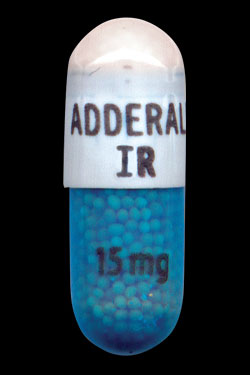
Drug-dealing does not come naturally to me. But gradually, the opportunity created by the ongoing shortage of Adderall IR (and its generic equivalents) gets impossible to ignore. Strict limits govern the supply of the drug’s ingredients (chiefly, amphetamine), and a number of manufacturers have already hit their caps—a reality of which I’m made aware after trying a dozen city pharmacies and learning they’ll be sold out until next year. I finally track down some at the Hoboken Family Pharmacy and pay $155 for 120 tablets. On the PATH train back, I ponder my good fortune in finding a pharmacy with the drug available, and in being so overprescribed. The blue pills in my pocket practically scream, “Sell me!”
Then I imagine myself in handcuffs. I see myself explaining to my hypothetical children that Mommy once did time for dealing in controlled substances. Maybe I should think further about the pros and cons.
I phone a college sophomore I used to babysit, figuring that as a student he’ll know Adderall’s present street value. He says that 10-mg. pills typically go for $7 to $10. But I notice that on Craigslist, where Adderall is exchanged under the label “study aid,” posts from buyers far outnumber those from sellers. I estimate I can price pills up to $12 apiece, for a profit of nearly 800 percent. On the other hand: “It’s good that you obtained the drugs legally. But Adderall is a controlled substance, so selling it is illegal,” criminal-defense lawyer Edward Kratt tells me. “And if you’re doing it over the Internet, there are interstate-commerce implications that might put the case under federal jurisdiction.”
It is at this point that I decide to chronicle the Adderall-dealing adventures of my dear friend Ellie.
Around 2 p.m. on a recent Thursday, Ellie advertises “Study aids to go!” via Craigslist. Within hours, she fields several inquiries. She agrees to meet her first client—Camille, a self-described “blonde Asian chick”—in the lobby of a downtown hotel to trade seven “ten-minute sessions” for $70. If anything goes awry, Ellie plans to call the office of Edward Kratt, Esq., whose number is written on a Post-it tucked into her underpants.
At the hotel, Camille spots Ellie first. Without a word, Camille, in a faux-mink coat and cropped, bleached hair, slides across the table a pack of Marlboro cigarettes containing the money. In turn, Ellie slides her a small jewelry pouch holding the pills. Emboldened, Ellie heads home to set up more meetings. The following day, she sells five pills for $60 to a thirtysomething NYU graduate student outside Café Habana, plus five more for the same price to a grateful black man in an asymmetrical jacket and ten for $100 to a demure white guy. She plans these last two transactions to take place within minutes of each other at the same Nolita boutique, a stroke of entrepreneurial efficiency she applauds herself for.
Four deals and $290 in, a man called Mike offers to buy 30 pills for $360. Ellie figures she’ll make this big sale her last. She heads to the Soho wine bar where they’ve agreed to meet. Mike never shows.
Determined to make the cash she had coming her way, Ellie checks in on a few people who had contacted her earlier, warning that she might soon run out of product. She books three more appointments this way. By the end of day three, she has sold 45 pills for $506, a profit of $351. But all the covert dialogue, price haggling, and rendezvous coordination is exhausting. It’s time to get out.
Ellie awakes on the fourth day to five new inquiries. She hesitates only a moment before replying. She wonders: Is this stuff addictive?
Have good intel? Send tips to intel@nymag.com.